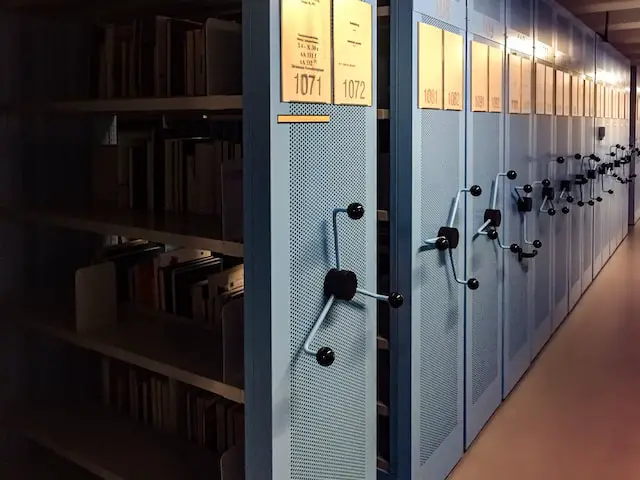Archives are generally more focused on preserving history and ensuring that records are available for future generations, while libraries are more focused on providing access to information and resources for the present generation.
What is an archive?

An archive is a collection of historical records, documents, or other types of materials that have been systematically collected, organized, and stored for future reference or research. These materials can include papers, photographs, maps, audio and video recordings, digital files, and other types of media. Archives are often maintained by organizations such as governments, universities, museums, libraries, or private businesses, and may be open to the public or restricted to specific users. The purpose of an archive is to preserve and provide access to valuable information and materials that document the past and present for future generations.
What is a library?
(Photo by Gabriel Sollmann on Unsplash )

A library is a collection of resources such as books, magazines, newspapers, manuscripts, maps, videos, sound recordings, and other materials that are organized for use by the public or a specific community. Libraries are usually operated by governmental bodies, universities, schools, or other organizations, and may be open to the public or restricted to specific users.
The primary purpose of a library is to provide access to information and promote education, research, and intellectual development. Libraries offer a wide range of services, such as borrowing materials, reference services, internet and computer access, literacy and language programs, and cultural events.
Libraries are important institutions that provide access to knowledge, preserve cultural heritage, and support lifelong learning. They play a critical role in promoting literacy, intellectual freedom, and community engagement.
Archives Vs. Libraries – Key differences
Archives and libraries are two distinct types of institutions that serve different purposes. Here are some key differences between archives and libraries:
Purpose: Libraries are generally open to the public and serve to provide access to a wide range of published materials such as books, journals, magazines, and newspapers, etc. Archives, on the other hand, are typically focused on preserving and providing access to unique and historical documents, photographs, and other materials that are considered to have enduring value.
Materials: Libraries collect and provide access to published materials, while archives collect and provide access to original documents, records, and other unique materials that are often one-of-a-kind and irreplaceable.
Access: Libraries are generally open to the public and provide access to materials on-site or through borrowing programs. Archives, however, often have more restrictive access policies due to the unique nature of their collections, and researchers may be required to demonstrate a specific research need in order to access certain materials.
Organization: Libraries organize materials according to a standardized system such as the Dewey Decimal or Library of Congress classification systems. Archives, on the other hand, often have their own unique organization systems based on the provenance or original context of the materials.
Preservation: Both libraries and archives are concerned with preserving materials, but archives often have a greater focus on preservation due to the unique and often fragile nature of their collections. Archivists may use specialized techniques such as conservation treatments, digitization, and proper storage to ensure the long-term preservation of materials.
While there is some overlap between archives and libraries in terms of their functions and goals, they serve different purposes and collect different types of materials.
The benefits of archives
Archives play a vital role in preserving our collective memory and cultural heritage. Here are some benefits of archives:
- Historical preservation: Archives serve as a repository for important historical records and documents, such as government records, personal papers, photographs, and audiovisual materials. These materials provide a window into the past, allowing us to learn about the people, events, and movements that shaped our world.
- Research: Archives provide a wealth of primary source material that can be used for research across a variety of fields, including history, sociology, anthropology, and genealogy. Scholars, students, and researchers rely on archives to conduct original research and develop new insights into our shared history and culture.
- Legal and administrative purposes: Archives are often used for legal and administrative purposes, such as establishing property ownership, verifying genealogical information, and providing evidence in legal proceedings.
- Accountability: Archives are critical for ensuring accountability and transparency in government and other organizations. Records held in archives can be used to monitor compliance with laws and regulations, track policy changes over time, and hold individuals and organizations accountable for their actions.
- Cultural heritage: Archives are important for preserving and sharing our cultural heritage. They provide a record of our collective cultural memory, including art, literature, music, and other forms of expression. Archives also play a role in ensuring that cultural heritage is accessible to future generations.
Archives are essential for preserving our history and culture, promoting research and learning, and ensuring accountability and transparency in society.
The benefits of libraries
Libraries play a vital role in providing access to information, promoting literacy and lifelong learning, and supporting community engagement. Here are some benefits of libraries:
- Access to information: Libraries provide free access to a wide range of materials, including books, journals, magazines, newspapers, and digital resources such as ebooks and online databases. This access to information allows people to explore new topics, stay informed on current events, and access resources they might not otherwise be able to afford.
- Lifelong learning: Libraries are an important resource for promoting lifelong learning. They offer educational programs, such as workshops, lectures, and book clubs, as well as access to educational resources such as online courses and research databases.
- Community engagement: Libraries serve as a hub for community engagement. They provide a safe and welcoming space for people of all ages and backgrounds to gather, learn, and connect. Libraries often host events and programs that bring people together and foster a sense of community.
- Literacy: Libraries play a critical role in promoting literacy and reading. They provide access to books and other reading materials, as well as programs and resources to support literacy development for people of all ages.
- Preservation of cultural heritage: Libraries play an important role in preserving our cultural heritage. They collect and preserve books, manuscripts, and other materials that represent our shared history and cultural heritage, ensuring that they are available for future generations to access and learn from.
Overall, libraries are essential for providing access to information, promoting lifelong learning, supporting community engagement, promoting literacy, and preserving cultural heritage. They play a critical role in supporting the growth and development of individuals and communities.
What are the types of archives?
Archives can be classified into several types, based on the nature and origin of their collections. Here are some of the most common types of archives:
- Government archives: These archives collect and preserve records and documents generated by government agencies at the local, state, and national levels. Government archives often include documents such as birth and death records, land deeds, court records, and administrative documents.
- Business archives: These archives collect and preserve records and documents generated by businesses and corporations. Business archives may include documents such as financial records, employee records, and marketing materials.
- Personal or family archives: These archives collect and preserve materials related to the lives of individuals or families, including diaries, letters, photographs, and other personal documents.
- Academic archives: These archives collect and preserve materials related to academic institutions, including university records, faculty papers, and student publications.
- Museum archives: These archives collect and preserve materials related to the collections and exhibitions of museums and other cultural institutions. Museum archives may include documents such as exhibition catalogs, correspondence, and photographs.
- Non-profit organization archives: These archives collect and preserve materials related to the activities and history of non-profit organizations, including records of fundraising activities, outreach programs, and advocacy efforts.
Archives serve as a valuable resource for scholars, researchers, and individuals interested in exploring the history and culture of different organizations and societies. By preserving and providing access to historical records, archives help to ensure that our collective memory is not lost to time.
Featured Image By – Catarina Carvalho on Unsplash








